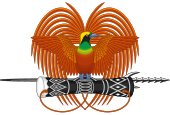
The politics of Papua New Guinea takes place in a framework of a parliamentary representative democratic multi-party system, whereby the prime minister is the head of government. Papua New Guinea is an independent Commonwealth realm, with the monarch serving as head of state and a governor-general, nominated by the National Parliament, serving as their representative. Executive power is exercised by the government. Legislative power is vested in both the government and parliament.
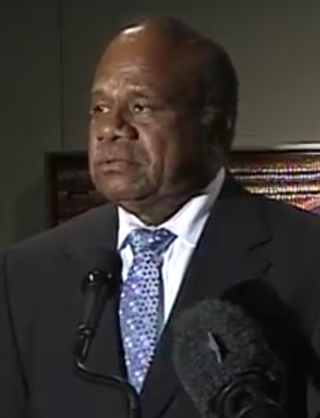
Sir Rabbie Langanai Namaliu was a Papua New Guinean politician. He served as the fourth Prime Minister of Papua New Guinea from 4 July 1988 to 17 July 1992 as leader of the Pangu Party.
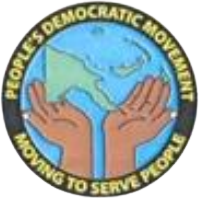
The People's Democratic Movement is a political party in Papua New Guinea.
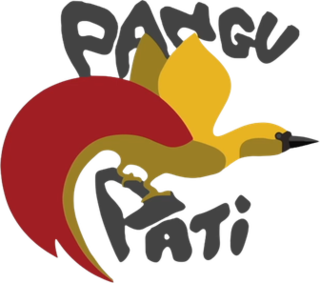
The Pangu Pati, officially Papua na Niugini Yunion Pati, is a nationalist and developmentalist political party on the centre-left in Papua New Guinea.The party is the oldest political party in Papua New Guinea and has held all levels of government throughout its history. As of 2023, it is the largest party in the National Parliament.

The People's Progress Party is a political party in Papua New Guinea.
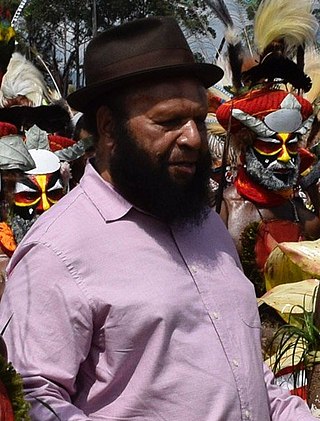
Paias Wingti is a Papua New Guinean politician. He served as the third Prime Minister of Papua New Guinea between 1985 and 1988, and again from 1992 to 1994.

General elections were held in Papua New Guinea from 30 June 2007 to 14 July 2007.

Sir Michael Thomas Somare was a Papua New Guinean politician. Widely called the "father of the nation", he was the first Prime Minister after independence. At the time of his death, Somare was also the longest-serving prime minister, having been in office for 17 years over three separate terms: from 1975 to 1980; from 1982 to 1985; and from 2002 to 2011. His political career spanned from 1968 until his retirement in 2017. Besides serving as PM, he was minister of foreign affairs, leader of the opposition and governor of East Sepik Province.

The National Alliance Party has operated as a political party in Papua New Guinea since 1995. As of May 2019, the party had 11 members in the 111-seat National Parliament of Papua New Guinea, and was part of the Alliance Accord for Change, opposition to the O'Neill led government for Papua New Guinea's 10th Parliament.

James Marape is a Papua New Guinean politician, who is serving as the Prime Minister of Papua New Guinea since May 2019. He has been a member of the National Parliament of Papua New Guinea since July 2007, representing the electorate of Tari-Pori Open in Hela Province in the highlands. He has held Cabinet Posts as Minister of Education (2008–2011), Minister of Finance (2012–2019), and Minister of Foreign Affairs (2023-present). Marape entered the 2022 elections under the banner of Pangu Party and won more seats than any other party. He was therefore entitled to form the government. His new government was elected unopposed by the new parliament.

General elections were held in Papua New Guinea between 18 June and 9 July 1977, the first since independence from Australia in 1975. The Pangu Party led by Prime Minister Michael Somare emerged as the largest in the National Parliament. Somare subsequently formed a coalition government with the People's Progress Party (PPP) and several independent MPs. Voter turnout was 60.3%.

General elections were held in Papua New Guinea between 13 June and 4 July 1987. The Pangu Party emerged as the largest party, winning 26 of the 109 seats. Voter turnout was 73.5%.
Sir Barry Blyth Holloway, KBE was an Australian-born Papua New Guinean politician.

Samuel H. Basil was a Papua New Guinean politician. He was a member of the National Parliament of Papua New Guinea from 2007, representing the electorate of Bulolo Open, until his death in 2022. From 8 June 2019, to August 2019 Basil served as the Treasurer of Papua New Guinea.

General elections were held in the Territory of Papua and New Guinea between 19 February and 11 March 1972. They saw the election of the country's first female MP, Josephine Abaijah.

General elections were held in the Territory of Papua and New Guinea between 17 February and 16 March 1968.

General elections were held in Papua New Guinea from 4 to 22 July 2022 to elect the members of the National Parliament for a new five-year term.
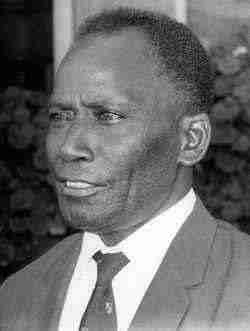
Sir Paul Lapun was the first Papua New Guinean to receive a knighthood. Both a supporter of independence for Papua New Guinea (PNG) and of the secessionist movement on Bougainville, Lapun served in the House of Assembly of Papua and New Guinea and in the first National Parliament of Papua New Guinea between 1972 and 1975, when he was Minister for Mines and Energy. He was instrumental in obtaining royalties for the people of Bougainville for the copper mine on their island.
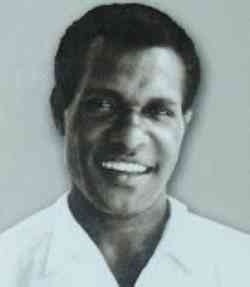
Sir Ebia Olewale (1940–2009) was a politician in Papua New Guinea (PNG). He was elected as a member of the House of Assembly of Papua and New Guinea in 1968 and went on to hold several ministerial positions during the period of self-governance and after PNG's independence in 1975, including that of deputy prime minister. He was knighted in 1983 and served as chancellor of the University of Goroka from 2000 to 2006. From 2002 until his death, he was a director of the Papua New Guinea Sustainable Development Program.
Job Pomat CMG is a Papua New Guinean politician. He has represented the electorate of Manus Open in the National Parliament of Papua New Guinea on two separate occasions since 2007 and has been Speaker of the National Parliament since 2017.
